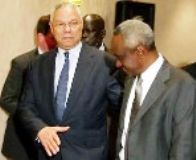US urges Sudan to curb militia, hails southern peace
By Arshad Mohammed
NAIROBI, Jan 8 (Reuters) – The United States urged Sudan’s Islamist rulers on Saturday to curb Arab militia attacks in Darfur and said peace efforts in the turbulent west should draw strength from an imminent end to a civil war in the south.

|
|
U.S. Secretary of State Colin Powell (L) shakes hands with Sudan’s First Vice President Ali Osman Mohamed Taha(R) as rebel John Garang (C) of the Sudan’s Peoples Liberation Movement walks behind them in Nairobi, January 8, 2005. (Reuters). |
Secretary of State Colin Powell, in Kenya to witness the signing of a north-south peace deal on Sunday, said sanctions were an option for the United Nations in its efforts to end Darfur’s “terrible conflict” but he declined to say if genocide is still taking place in the western region.
The peace agreement, which will end Africa’s longest-running civil war, will be signed four months to the day that Powell declared genocide had taken place in Darfur and that Khartoum and government-backed Janjaweed militias were responsible.
“We can’t overlook that while we are celebrating tomorrow the achievement in north-south dialogue, we continue to have the difficult, terrible conflict in Darfur.”
Powell was flanked by southern rebel leader John Garang and his main negotiating partner, Sudanese First Vice President Ali Osman Mohamed Taha, who will sign the comprehensive peace agreement in front of African heads of state.
Powell said that in a meeting with Taha he stressed “the importance that we attach to the government of Sudan doing everything possible to rein in the Janjaweed and the militias and we also need to make sure that the (Darfur) rebels don’t contribute to the problem.”
“The U.N. still has options before it, to include sanctions, and we do not take any of those options off the table.”
The United States lists Sudan as a state sponsor of terrorism because of Khartoum’s record of hosting militant Islamists – including Osama bin Laden in the early 1990s – and maintains a range of economic curbs against it. Sudan denies sponsoring terrorism.
The Bush administration last year drafted a U.N. resolution threatening sanctions unless Khartoum disarmed the Janjaweed, but ran into opposition from several countries including China, which buys Sudanese crude and invests in its oil industry.
U.N. Secretary-General Kofi Annan said on Friday fighting in Darfur was escalating and the region could face new violence despite efforts by the U.N. Security Council and others.
Asked if genocide was still occurring, Powell avoided answering and said: “It was my judgment that genocide was taking place and I haven’t seen the secretary-general’s latest report but I look forward to examining it.”
MODEL FOR DARFUR?
The southern civil war began in 1983 and broadly pits the Islamist government based in Khartoum against the mainly Christian and animist south. The fighting has killed some 2 million people and forced millions more from their homes.
Oil, ethnicity and ideology have complicated the conflict, Africa’s longest-running civil war.
Diplomats say a north-south deal may be a model for Darfur, where the crisis has uprooted more than 1.6 million Darfuris.
The United Nations estimates 70,000 people have died of malnutrition and disease in Darfur since aid agencies began a massive aid effort in March last year. The Sudanese government disputes the figure.
The crisis in Darfur was triggered in February 2003 when pastoral rebel groups took up arms against the government in a struggle over power and scarce resources. Khartoum retaliated by arming nomad militia, accused of conducting a campaign of murder, rape and arson against villagers.
Taha said of Darfur: “We have to join hands in trying to resolve the situation in Darfur so that we have finally a national, comprehensive peace in all parts of the country.”
Garang said he planned to push for peace there once he joined a national unity government under the peace accords.
